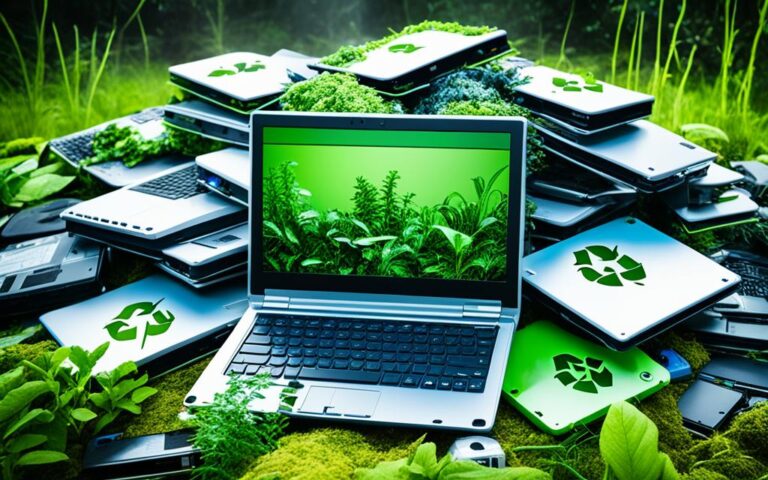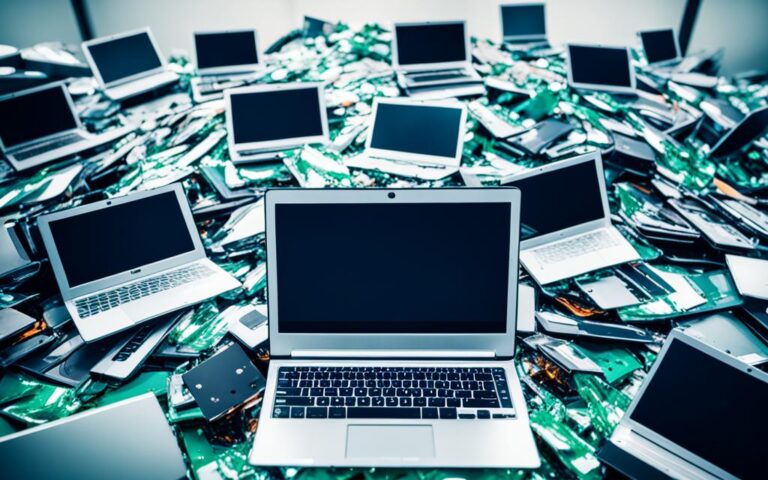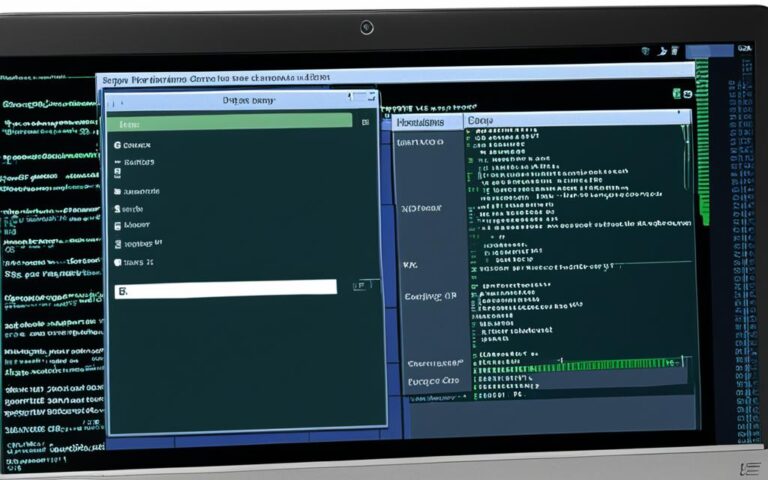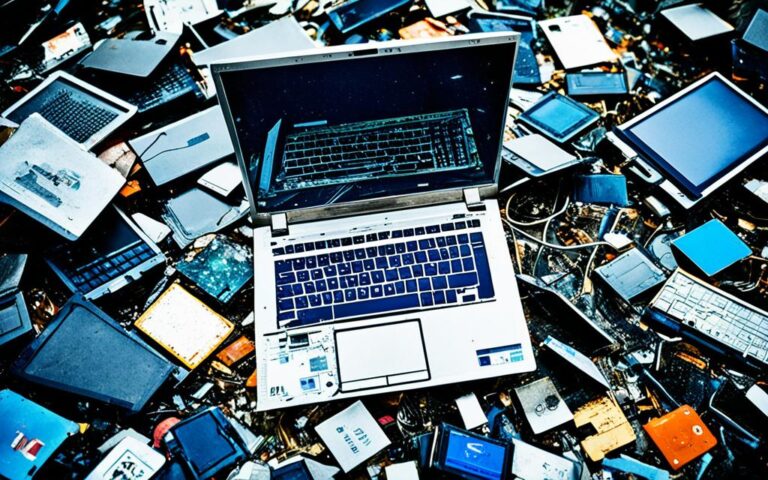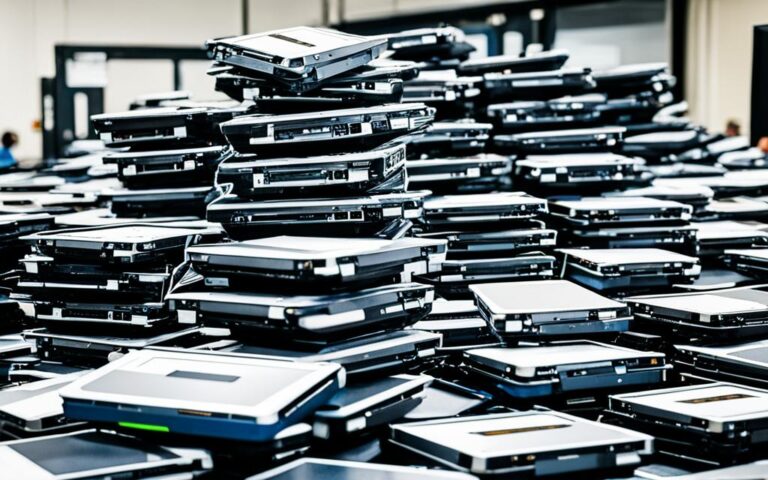The Impact of Laptop Recycling on Sustainable Development Goals
Laptop recycling plays a crucial role in advancing the Sustainable Development Goals (SDGs) by creating a greener and more sustainable future. By responsibly recycling laptops, businesses can contribute to SDG 12 (Responsible Consumption and Production) by reducing waste generation and promoting sustainable resource management. It also helps to address the global challenge of electronic waste (e-waste), which contributes to environmental degradation.
Small businesses, like those in Dublin, are turning to responsible recycling solutions, such as Recycle IT, to manage the disposal of electronic equipment in a sustainable manner. This not only diverts e-waste from landfills but also enables the recovery of valuable resources like gold, silver, copper, and rare earth metals through recycling.
The Significance of Small Business Recycling
Small businesses play a significant role in innovation and progress, but the advancement in technology leads to a growing pile of obsolete devices and electronic waste (e-waste). Recognizing this challenge, small businesses are turning to responsible e-waste recyclers like Recycle IT in Dublin. By partnering with these recyclers, small businesses actively contribute to reducing the environmental impact of e-waste by diverting it from landfills and enabling the recovery of valuable resources. According to the United Nations, approximately 53.6 million metric tons of e-waste were generated globally in 2019 alone.
By recycling electronic equipment, small businesses also support SDG 8 (Decent Work and Economic Growth) by fostering employment opportunities in recycling facilities and promoting a circular economy model.
Environmental Impact of Small Business Recycling
Small businesses that engage in responsible e-waste recycling significantly contribute to minimizing the environmental impact of electronic waste. By diverting e-waste from landfills, these businesses help prevent harmful chemicals and pollutants from seeping into the soil and water sources. This action mitigates the risk of environmental degradation and ensures a more sustainable future for all. Furthermore, responsible e-waste recyclers employ specialized processes to recover valuable resources like gold, silver, copper, and rare earth metals from discarded devices, reducing the need for resource-intensive mining activities.
“Small businesses turning to responsible e-waste recyclers actively contribute to reducing the environmental impact of e-waste by diverting it from landfills and enabling the recovery of valuable resources.”
The Role of Small Business Recycling in the Circular Economy
Small business recycling not only helps protect the environment but also promotes the principles of the circular economy. By recycling electronic equipment, small businesses extend the lifespan of valuable materials and components, reducing the need for raw material extraction. This sustainable approach fosters a more efficient use of resources and reduces waste generation, contributing to SDG 12 (Responsible Consumption and Production). Moreover, by partnering with responsible e-waste recyclers, small businesses encourage the development of local recycling infrastructure and employment opportunities, supporting SDG 8 (Decent Work and Economic Growth).
| Environmental Impact | Economic Benefits | Resource Conservation | |
|---|---|---|---|
| Small Business Recycling | Reduces e-waste pollution | Supports local job creation | Promotes resource recovery |
| Landfill Disposal | Leaches harmful chemicals into the environment | Missed opportunities for job creation | Wasted valuable resources |
By actively participating in small business recycling initiatives, companies can align their operations with sustainable practices, effectively contribute to environmental protection, and positively impact their local communities.
Partnering with responsible e-waste recyclers not only helps small businesses fulfill their social and environmental responsibilities but also builds a greener and more sustainable future for generations to come.
The Importance of Secure Data Destruction
One critical aspect of electronic recycling, especially for businesses handling sensitive data, is the secure destruction of storage devices. Improper disposal of electronic devices can pose significant data security risks, potentially leading to data breaches and identity theft. Recycle IT emphasizes the importance of physical destruction of hard disk drives and other forms of data storage to ensure that sensitive information doesn’t fall into the wrong hands. By prioritizing secure data destruction processes, Recycle IT guarantees the protection of confidential information, providing peace of mind to businesses concerned about data security.
When it comes to electronic recycling, simply deleting files or formatting storage devices is not enough to guarantee data security. Sophisticated data recovery techniques make it possible to retrieve information even from seemingly erased devices. That’s why secure data destruction is crucial to ensure that no trace of sensitive data remains.
To eliminate any possibility of data breaches, Recycle IT employs specialized equipment and methods to physically destroy storage devices. Hard disk drives, solid-state drives, and other forms of media are carefully shredded or crushed, rendering them completely unusable. The process follows strict security protocols and complies with relevant data protection regulations to safeguard the confidentiality of sensitive information.
“Secure data destruction is a critical step in the electronic recycling process. By ensuring that sensitive information is permanently destroyed, businesses can mitigate data security risks and protect their reputation.”
Recycle IT’s secure data destruction services are particularly vital for industries such as healthcare, finance, and government organizations, where the protection of confidential data is paramount. These sectors handle a vast amount of sensitive information, including personal records, financial data, and sensitive government documents. In the wrong hands, such information can be misused for fraudulent activities or compromise national security.
Partnering with a trusted and certified electronic recycling provider like Recycle IT allows businesses to fulfill their ethical and legal obligations while minimizing the risk of data breaches. By securely destroying data storage devices, businesses can confidently dispose of outdated or non-functional equipment, knowing that all sensitive information has been irreversibly eliminated.
The Benefits of Secure Data Destruction:
Secure data destruction offers several important benefits for businesses:
- Protection against data breaches and identity theft
- Compliance with data protection regulations and industry standards
- Preservation of reputation and customer trust
- Prevention of legal and financial liabilities
- Facilitation of environmentally responsible electronic recycling
By prioritizing secure data destruction as part of their electronic recycling practices, businesses can safeguard sensitive information, mitigate data security risks, and contribute to a safer digital environment.
| Benefits of Secure Data Destruction |
|---|
| Protection against data breaches and identity theft |
| Compliance with data protection regulations and industry standards |
| Preservation of reputation and customer trust |
| Prevention of legal and financial liabilities |
| Facilitation of environmentally responsible electronic recycling |
Network Recycling as a Solution for E-Waste Reduction
Network Recycling is a game-changing solution that tackles the growing problem of electronic waste while promoting sustainable resource management. Unlike traditional isolated recycling centers, Network Recycling establishes a unified and coordinated system of facilities and processes. This interconnected network ensures the efficient, ethical, and environmentally responsible handling of electronic waste, paving the way for a greener future.
The Power of Connectivity
In Network Recycling, devices are seamlessly transported to specialized recycling facilities via a well-established network. These facilities utilize advanced technologies and expertise to assess each device for any refurbishable or reusable components. By maximizing the reuse of functional parts, Network Recycling reduces the demand for new resources and minimizes waste generation.
Non-reusable parts are efficiently separated and processed to extract valuable materials, such as gold, silver, copper, and rare earth metals. Through this meticulous extraction process, Network Recycling ensures the recovery of valuable resources that can be reintegrated into the production of new electronic devices, fostering a circular economy.
Maximizing Efficiency, Minimizing Waste
By optimizing resources and minimizing waste, Network Recycling makes a significant contribution to e-waste reduction efforts. This innovative approach streamlines the entire recycling process, from collection and transportation to assessment, refurbishment, and material extraction.
To illustrate the efficiency of Network Recycling, consider the following table:
| Key Metrics | Isolated Recycling Centers | Network Recycling |
|---|---|---|
| Waste Generation | Higher | Lower |
| Resource Recovery | Limited | Optimized |
| Environmental Impact | Higher | Lower |
This comparison clearly highlights the advantages of Network Recycling over isolated recycling centers. Network Recycling not only reduces waste generation but also maximizes resource recovery and minimizes environmental impact, making it a sustainable choice for managing electronic waste.
Joining the Network Recycling revolution is an effective way for businesses and individuals alike to actively contribute to a greener and more sustainable future. By embracing this innovative approach, we can collectively make a difference in the fight against electronic waste and promote responsible, sustainable resource management.
Conclusion
Laptop recycling plays a crucial role in advancing the Sustainable Development Goals (SDGs) and creating a more sustainable future. By responsibly recycling laptops, businesses contribute to SDG 12 (Responsible Consumption and Production) and reduce waste generation. This not only addresses the environmental concerns associated with e-waste but also fosters employment opportunities and supports the local economy.
Collaborating with responsible e-waste recyclers, such as Recycle IT, small businesses actively contribute to e-waste reduction efforts. By diverting electronic waste from landfills and enabling the recovery of valuable resources, businesses embrace their responsibility towards a more sustainable future for all. Additionally, network recycling provides a holistic approach to electronic waste management, ensuring that it is handled efficiently, ethically, and with the least environmental impact.
Embracing responsible e-waste management practices is a significant step towards building a sustainable future. By reducing waste, supporting circular economy models, and promoting sustainable resource management, businesses and communities demonstrate their commitment to creating a greener and more sustainable world.
FAQ
How does laptop recycling contribute to the Sustainable Development Goals?
Laptop recycling plays a crucial role in advancing the Sustainable Development Goals by promoting responsible consumption and production, reducing waste generation, and supporting sustainable resource management. By recycling laptops, businesses can contribute to SDG 12 and create a greener future.
Why is small business recycling important?
Small business recycling is important because it helps reduce the environmental impact of electronic waste (e-waste) and supports the local economy. By partnering with responsible e-waste recyclers, small businesses can contribute to e-waste reduction efforts and create a more sustainable technological landscape.
How does secure data destruction contribute to electronic recycling?
Secure data destruction is crucial in electronic recycling to protect sensitive information from data breaches and identity theft. Improper disposal of electronic devices can pose significant data security risks. By prioritizing secure data destruction processes, businesses can ensure the protection of confidential information and contribute to responsible electronic recycling.
What is Network Recycling and how does it contribute to e-waste reduction?
Network Recycling is an innovative approach that establishes a coordinated system of recycling facilities and processes. By connecting recycling centers and optimizing resources, Network Recycling ensures that electronic waste is handled efficiently, ethically, and with minimal environmental impact. This approach contributes to e-waste reduction efforts and promotes sustainable resource management.
What benefits does laptop recycling bring to businesses and communities?
Laptop recycling brings several benefits to businesses and communities. It contributes to responsible consumption and production, reduces waste generation, fosters employment opportunities in recycling facilities, supports the local economy, and helps create a more sustainable future for all.








